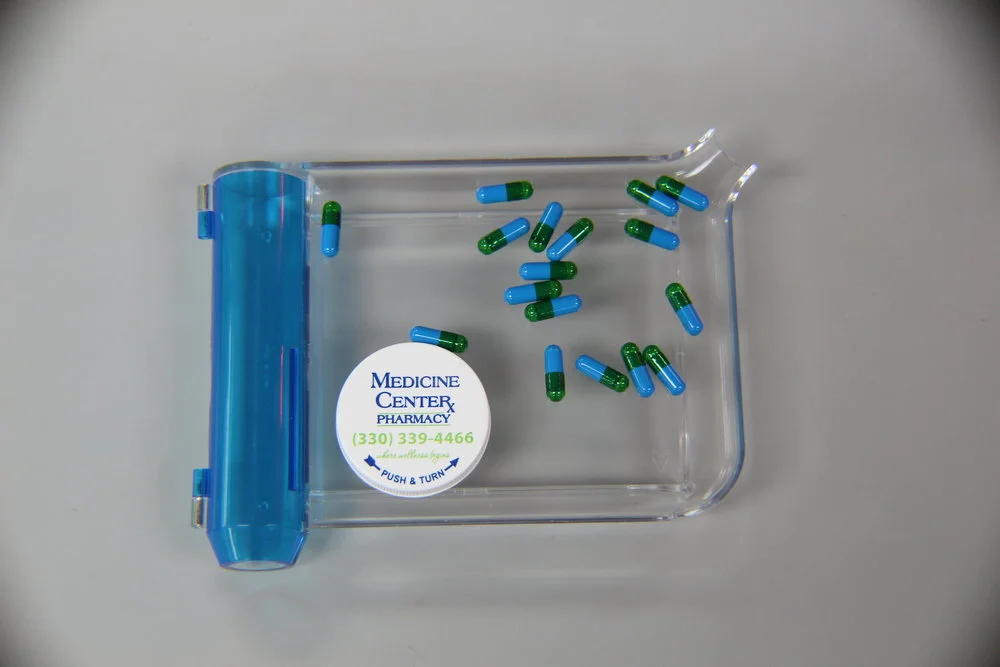Save money on your over-the-counter products. BOGO on Health Mart brand items. Huge variety of items available!
Posted by Medicine Center Pharmacy on Wednesday, November 16, 2016
Lower Cost from Less Advertising
How many commercials do you see every day for typical products like soaps, lotions and medicines? Many large companies spend millions of dollars on advertising; a cost that makes their product more expensive and your expense higher. Instead of paying more for a fancy label and catchy commercials, try a store brand item and save some money. If you are worried that the store brand item may differ from a known brand, simply compare the ingredients list.
Better Selection
If you consider store brand items as you shop, you have a wider selection of items to help you find the right product. Store brand products can offer unique options not available in national brands. If you save money by purchasing a less expensive item, you have more to spend on other items for yourself and your family.
Supports Competition
Competition means more options and competition in the marketplace. If a national brand decides to discontinue one of their products or variants, store brand and less advertised products offer viable alternatives. Smaller brands can also create and sell new or niche products that national brands don't offer.
Whether you are looking to save money or trying to find the right product for your needs, take a look at store brand, generic and less advertised options. We think you will like what you find.
The leaves are changing, the air is getting crisp, and pumpkin-flavored goodies are hitting the shelves. This can only mean one thing... flu season is upon us. Keep reading for answers to some of the most common questions about the flu and the flu vaccine.
Is the flu really that serious?
Yes. The flu can cause serious illness, hospitalization, and even death. It's estimated that the flu causes up to 200,000 hospitalizations in the United States each year and is the most frequent cause of death from a vaccine-preventable disease.
Who should get the flu shot?
The Centers for Disease Control (CDC) recommends everyone six months of age and older without a severe, life-threatening allergy to the vaccine get their flu shot every year. Talk to your doctor before getting the vaccine if you have an allergy to eggs or have ever had Guillain-Barré Syndrome.
Does the flu shot work right away?
No. It takes about two weeks after vaccination for your body to build up the immunity to protect you against the flu virus.
When should I get the flu shot? How long will the flu shot last?
You can get the flu shot as soon as it becomes available. While the peak of flu season is between December and March, the flu can hit as early as October and as late as May... this is why it's recommended that you receive the flu vaccine early, preferably by October. The vaccine lasts about a year, so don't worry about getting the vaccine too early and being exposed to the flu later in the season.
If you missed getting your vaccine in the fall, it's never too late to get yourself protected. You can get the flu shot at any point in the flu season as long as the vaccine is still available.
Will getting the flu shot cause me to get the flu?
Definitely not. The flu shot is made from an inactive form of the virus, so it's impossible for the vaccine to cause the flu. Often times symptoms from another illness are confused for the flu. However, it does take two weeks for the vaccine to work. If you were exposed to the flu before or during these two weeks, it is possible to get the flu... but this is not a result of the vaccine.
Are any of the available flu vaccines recommended over the others?
There is no preference for one injectable vaccine over another. In previous years a vaccine given as a nasal spray was available... this method is no longer recommended due to concerns that it is not as effective as the injections.
I've been feeling sick lately... can I still get the flu shot?
Wait to get the flu shot until you're feeling better, do not have a fever, and are off any antibiotics.
Sources:
http://www.cdc.gov/flu/about/season/flu-season-2016-2017.htm
If you or a loved one utilizes Medicare and receives prescription medications through the Medicare Part D drug plan, now is the time to reevaluate plans.
It is important to select an affordable Medicare Part D plan that covers the medications you need. We would be happy to help you with this decision and answer any questions you may have.
Open enrollment ends on December 7th. Now is the time make an informed choice with help from your pharmacist. To get your free Medicare Part D consultation, contact your local Medicine Center Pharmacy today.
Shingles is a very painful, debilitating disease that can cause lifelong consequences such as nerve pain (known as post-herpatic neuralgia, or PHN) and sometimes even blindness. Shingles starts as a blister-like rash, usually on the trunk or face on one side of the body. These blisters usually scab over within 3-5 days, but the rash and pain can last much longer. The shingles vaccine can help prevent this very painful disease. Keep reading to find out the answers to some common questions about the shingles vaccine.
Do I really need to worry about getting shingles?
Yes; shingles is extremely common. Each year in the United States, about 1 million people get shingles. That means that 1 in 3 people will get shingles in their lifetime.
What causes shingles?
The virus that causes shingles is the same virus that gave you chicken pox as a kid. That virus has been in your body ever since you got the chicken pox, but is inactive. Shingles occurs when that virus suddenly wakes up and becomes active again.
Who should get the shingles vaccine?
The Centers for Disease Control (CDC) recommend that everyone 60 years of age and older get the shingles vaccine, unless they have a life-threatening or severe allergy to the vaccine. Some people may receive the vaccine at a younger age if their doctor thinks it is necessary, but the CDC does not have any recommendations regarding getting the vaccine before 60 years of age.
Some people should not receive the shingles vaccine. This group includes people who have a weakened immune system (such as those undergoing cancer treatment, HIV treatment, or are taking steroid medication) and pregnant women.
What are the side effects of the vaccine?
Side effects of the vaccine are very mild. Some people experience redness, swelling, tenderness, or itching at the injection site (the back of the upper arm) or headache.
I already had shingles... do I still need to get the vaccine?
Yes. Though it is uncommon, you can get shingles more than once.
My spouse has shingles now and I'm not vaccinated... am I at risk?
No more at risk than you normally are. Exposure to shingles cannot give you shingles.
I can't remember if I ever had the chicken pox... should I still get the shingles vaccine?
Yes. Studies show that 99% of people over the age of 40 have had the chicken pox, whether they remember it or not. Doctors recommend that everyone 60 years or older get the vaccine unless they have a contraindication, even if they don't remember having chicken pox.
How well does the shingles vaccine work?
The shingles vaccine reduces your chance of getting shingles by about 51%, and reduces your risk of post-herpatic neuralgia by about 67%. Although the vaccine is not a guarantee that you won't get shingles, it will greatly decrease the length and severity of the disease if you would still happen to get shingles.
Sources:
https://www.cdc.gov/shingles/vaccination.html
Under pharmacist supervision, technician independently performs tasks related to:
- Filling of medication orders
- Handle customer phone calls
- Coordinate transfer prescriptions from other pharmacies
- Accurate and timely...
If you are looking for ways to cut your medication costs, you aren’t alone! A report from the National Center for Health Statistics shows that millions of adult American’s skip their medication because they can’t afford it.
Not taking medication as prescribed can cause serious problems, leading to unnecessary complications resulting in additional medical care. Whether you have no health insurance to help cover needed prescription medications – or if you have health insurance but your co-pays are prohibitive – there are ways to help!
Medicare Patients
Did you know that most folks save hundreds of dollars per year just by making sure that they are on the Medicare Part D plan that fits their medications properly? Medicine Center Pharmacies can provide you with a free plan comparison that will compare premiums, deductibles, co-pays and even tell you when you are projected to hit the donut hole.
If you are on Medicare you have the opportunity to either continue with your current Medicare Part D plan, or switch to a new plan during Open Enrollment.
Cash and Private Insurance Patients
Pharmacists can assist you in finding ways to save some money. You can ask for:
- A generic or similar medication
- Pill splitting works when there is little or no cost difference between low dose and high dose pills. With a low priced pill splitter you may be able to buy the higher dose version and save
- Manufacturer offered financial assistance (even coupons) for some high priced medications
- Volume or loyalty discounts for filling multiple prescriptions
Whether you are a Medicare or Cash/Private Insurance patient, there are often a number of strategies to save money. Your pharmacist is often the best resource available to help you save money on your prescription medications.
Many of our aging parents may be taking medications to treat ailments or disease. As someone who loves them, you may have concerns about the treatments and the difficulties of getting the correct dosages at the correct time. Here are three strategies for making sure your parents are safely taking their medications:
Communicate with your Parent and the Doctor
Ask your parent if they have been taking all of their medications correctly or if they have any concerns about their medications. If they have issues with the medications or schedule, it is important to consult their doctor to make the proper adjustments (DO NOT try to make these changes on your own). A doctor may be able to recommend alternative methods including extended-release pills, pill crushing or rescheduling.
Communicate with your Parent and the Pharmacist
Doctors check for interactions between medications, but a pharmacist is also available to be sure that all medications (and even over-the-counter supplements) are not interfering with each other. Pharmacists can often recommend alternative treatment if a medication has a certain side-effect or drawback.
Try New Packaging Options
Often, a simple pillbox or pill packaging can be helpful in making sure that the correct medications are delivered on time. Here at Medicine Center, we offer multiple packaging options to make what can be a confusing ordeal an easy, stress-free process.
One packaging option we offer is a weekly dosage card. These are arranged by day of the week and dosage time (morning, noon, evening, and bedtime), and each medication is carefully placed by the pharmacist in the appropriate time slot for each day of the week. To take the medications, you or your loved ones simply open the bubble pack on the correct day and time and take the medications contained in that slot.
Another packaging option we offer is our pill packet "baggie" system. In this option, the medications are packaged by date and dosage time in small, easy-open pouches. Each pouch is clearly labeled with not only the date and time, but a list of each medication in the pouch and their physical descriptions for your peace of mind. The pouches are connected in a strip which is put into a small box; taking your medications is as easy as tearing open the pouch and pulling out the strip so that your next dose is ready and waiting.
Each of these packaging options is an easy, cost-free way to stay organized and on track with your medications. Whether you need help organizing your own medications or have a loved one who struggles to manage it on their own, pharmacists want to help you take control of your medications with confidence, convenience, and care.
(Parts of this post adapted from http://www.pronvest.com/seeing-mom-dad-take-medications/ )

























